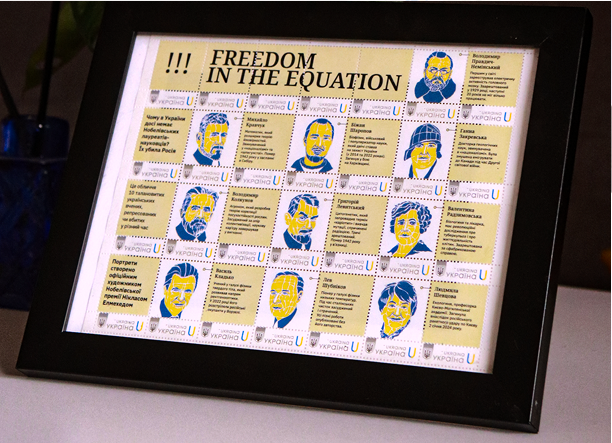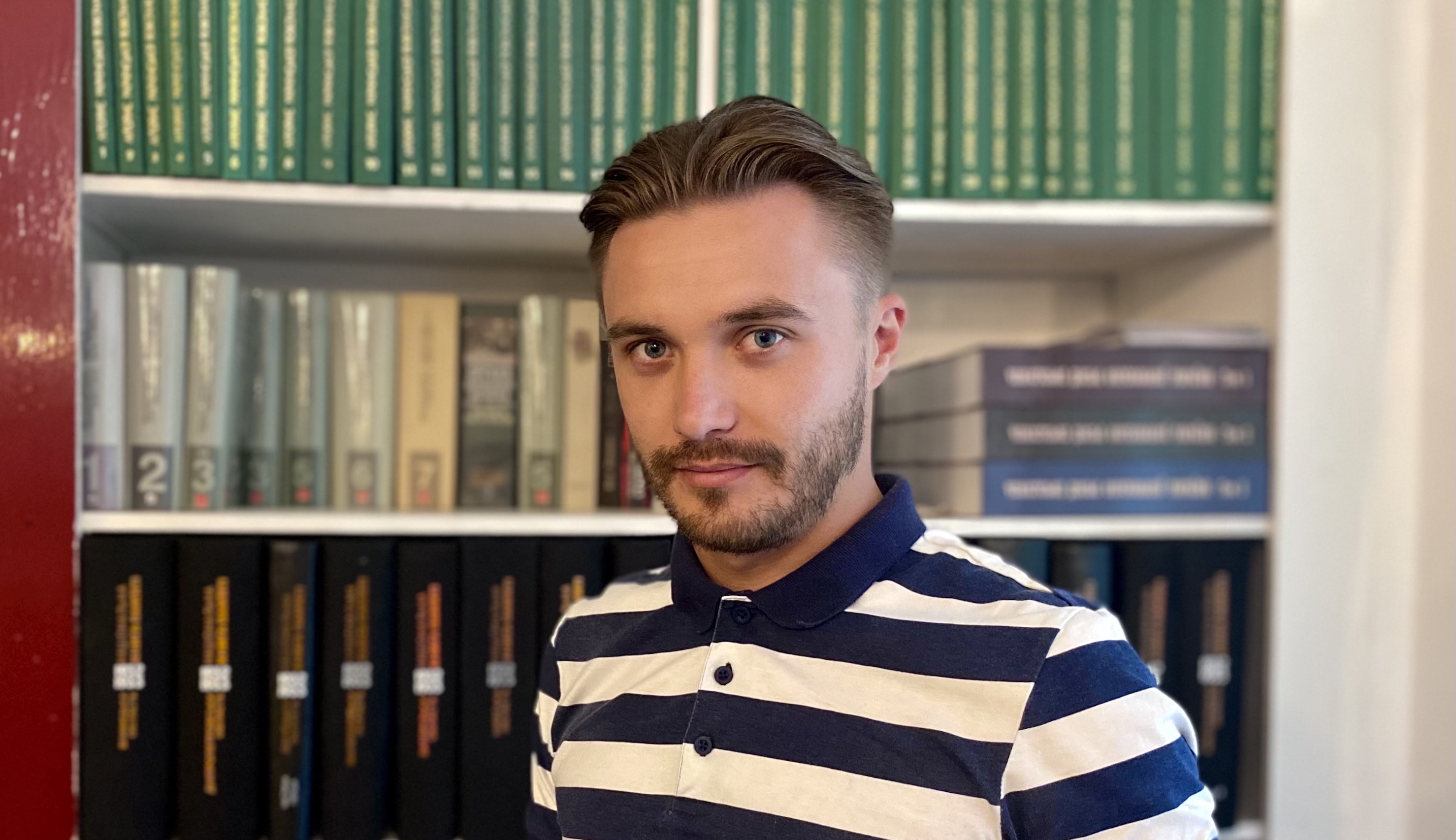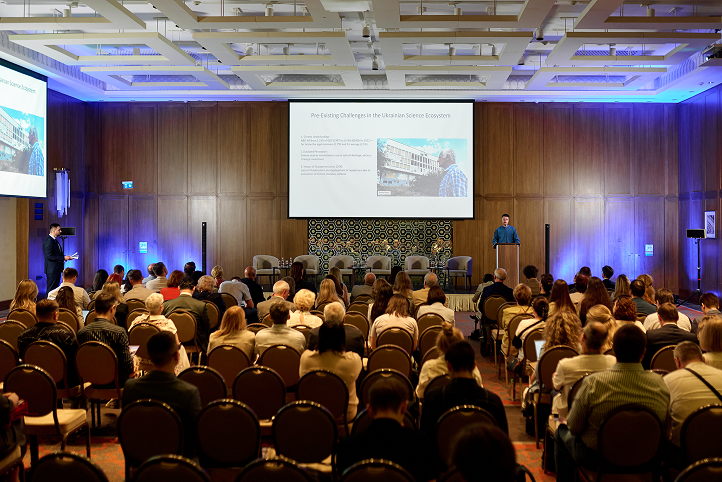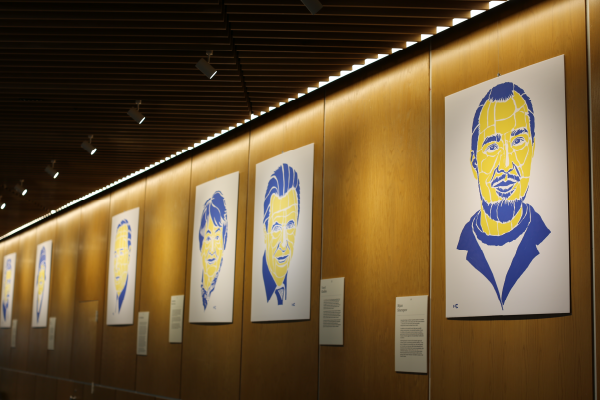

Grygoriy Rii's Blog: How to Communicate Issues of Endangered Science
22.08.23
Grygoriy Riy has been working at the Analytical Center on Education of the Borys Grinchenko Kyiv University for over three years, where he's been collaborating with colleagues to prepare educational materials. Additionally, as a historian, he teaches and writes columns and articles for "NV Opinions," "Forbes Ukraine," and "Istorychna Pravda" (Historical Truth). He joined the Science at Risk project as an analyst. In this blog post, you will find out more about what Grygoriy Riy is researching in the project, the challenges his research group has faced, and the upcoming scope of their work.
In Science at Risk, I became part of the science communication group, a field, which, in my opinion, is crucial, especially in times of conflict. Despite the fact that crisis periods usually lead to declines in funding and reduced opportunities for thorough scientific research, science should structure the complex societal reality and help combat the spread of pseudoscientific ideas and theories that fill the information vacuum. Furthermore, science should play an important, perhaps even leading, role in countering hostile propaganda. In times of war, the enemy can effectively use and does use the dissemination of fabricated ideas to achieve their military-political goals and disorganize the population.
Timely and accurately communicating of scientific knowledge, popularizing high-quality scientific research during cataclysms and wars among citizens help calm society, refute false information, and counter hostile disinformation. As a result, this increases psychological and emotional resilience of the population and enables critical evaluation of the situation.
I am part of a subgroup working on an analytical document about science popularization during crises. After analyzing existing research on this topic, we concluded that the main problem of our study is the lack of an understanding in Ukraine of the value of science as an essential component of the modern state and society. This lack of understanding has deepened during the war, leading to the proliferation of pseudoscientific theories and ideas.
As part of preparing the white paper, we aim to provide answers to the following research questions:
1. How has the Ukrainian science communication field changed during the pandemic and the full-scale invasion (2020-2023) compared to a more stable period (2012-2019)?
2. How do similar scientific sectors in other countries overcome problems?
3. How can science communication counter Russian disinformation?
4. How do Ukrainian science popularizers combat propaganda and misinformation?
5. What funding instruments are available for science communication in Ukraine, Poland, Germany, and the USA?
During the discussions within our subgroup, we concluded that the most relevant and effective method for our research is semi-structured in-depth interviews with science popularizers in Ukraine. As part of our work on the white paper, we plan to conduct up to 20 such interviews. Their analysis allows us to gather and systematize the opinions of those directly involved in science communication in Ukraine.
To select respondents, our subgroup compiled a list of Ukrainian science popularizers, encompassing more than 150 resources and individuals. The main selection criteria included diversification of fields of knowledge and channels of communication with the audience, year of establishment, number of subscribers and views, and content type. We also pay special attention to Ukrainian media covering science-related issues and publishers of popular science. An auxiliary method is desk research, which will be analyzing international experience in science communication during crises and considering other countries' experience in supporting science communication initiatives.
While we are in the midst of our research, namely at the stage of conducting interviews and actively communicating with Ukrainian science popularizers, it’s hard to make any conclusions. However, we can already see some preliminary results. First and foremost, we noticed that the development of science communication in Ukraine can be divided into two periods:
1. A stable period before the pandemic, during which Ukrainian science communication was emerging, exploring new communication channels with the audience and gaining systematic features.
2. A crisis period, when due to the rapid spread of coronavirus and the full-scale invasion by Russian forces on February 24, 2022, Ukrainian science and society faced threats but also acquired new opportunities for rapid development.
The respondents we interviewed noted that the pandemic and the war acted as crises that led to the adoption by scientists of new communication methods with a broader audience, motivated researchers to work harder, reach new levels in popularizing their scientific topics, and discover opportunities to get additional funding for their existing or new science communication projects.
We have also identified one more peculiar detail of science communication during crisis periods. During pandemic-related restrictions, there was a demand in society for scientists to explain complex topics such as biology, virology, and the history of diseases and pandemics. After the full-scale invasion, the main issues shifted to civil defense, nuclear threats, environmental protection, and countering disinformation, for instance, in history. All these topics required scientific explanations. However, we have discovered that there were not many public scholars in Ukraine who were willing to expertly explain these complex topics to the general public in accessible manner. Moreover, there is no unified coordinating body or expert group for any of these areas that would include representatives from relevant governmental structures, public and scientific communities, and journalists. This leads to discrepancies and even more questions among the citizens.
Despite the fact that our research is still ongoing, we are already able to highlight certain wishes and recommendations from science popularizers to facilitate the development of this field. Particularly during crises, the government should involve more scientists in consulting and joint development of positions on problematic issues and their communication with the public. At the same time, Ukrainian scientists should be prepared to join expert discussions and engage in such expert groups alongside other stakeholders at any time.
Ukrainian businesses should pay attention to Ukrainian science popularizers, finance their projects, and invite them for corporate lectures, thus spreading scientific knowledge among their employees. Ukrainian society must learn to think critically and find rational grains amidst enemy disinformation and situational pseudo-experts.

